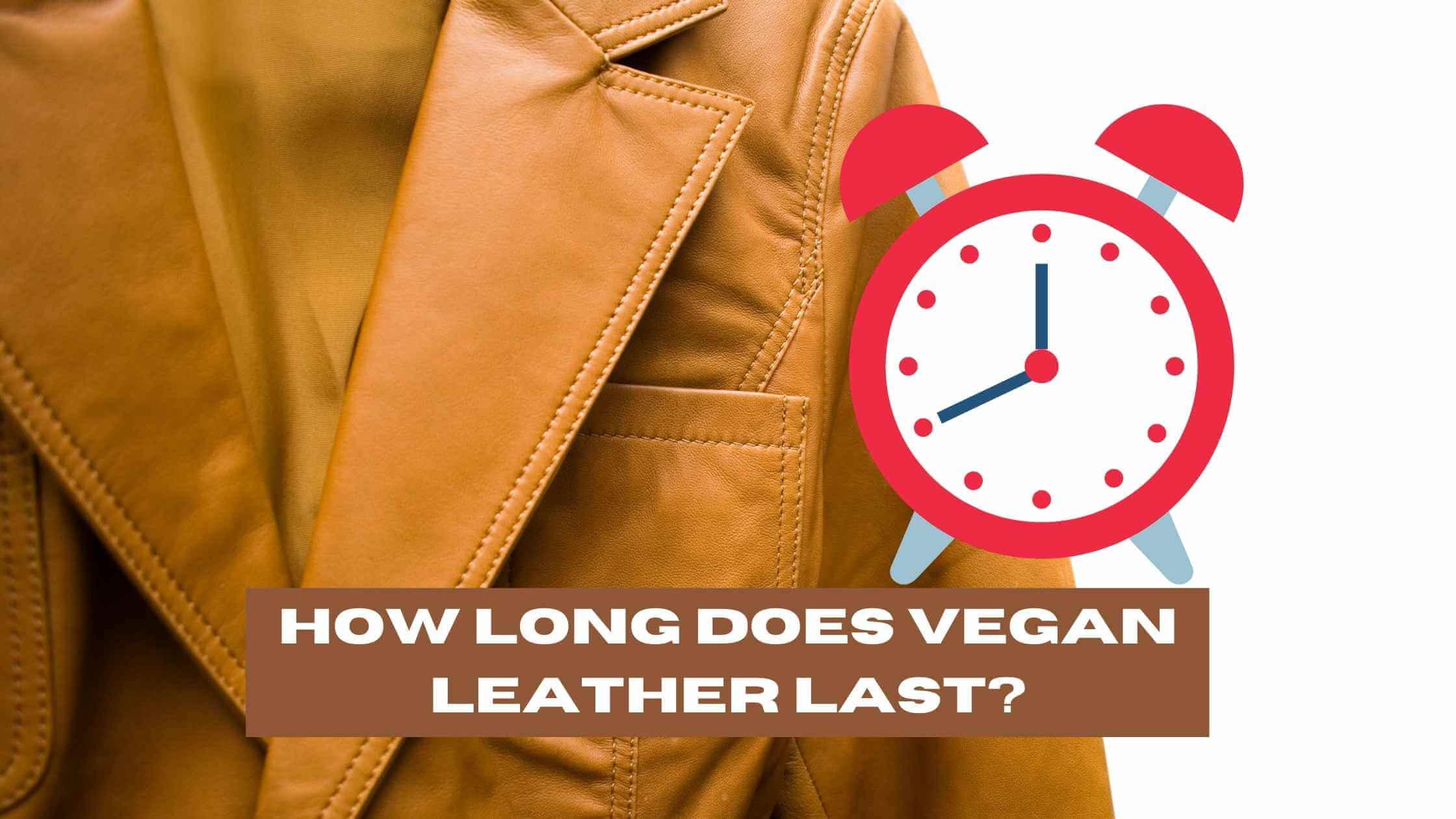The world of leather is broad enough now that it also includes a reliable alternative to the real thing. One of them is vegan leather. But how long does vegan leather last?
Vegan leather lasts between 2 and 5 years, whereas genuine leather can last 10+ years and even beyond 20 years with proper care and attention. Vegan leather might be an excellent alternative for those who don’t want to invest in authentic leather, but it doesn’t last as long.
Vegan leather is easier to care for than authentic leather. Still, it’s not as durable since its fabric, and plastic layers are initially separate and, therefore, weaker than the carefully processed and tanned animal skin from classic leather.
What is vegan leather?
Vegan leather can be a little bit of everything. But, at its core, it’s a kind of leather created from materials other than animal skin! As far as what it can be produced from…the sky’s the limit! Back in the 90s, it was plastic (earning it the nickname “pleather”).
Nowadays, you can find vegan leather made from cork, pineapple, cactus leaves, and more. If you’re curious, I’ve written about what cactus leather is to help you see your alternative choice in detail! As vegan leather becomes increasingly popular, that list of materials is only expected to increase.
How expensive is vegan leather?
The cost of vegan leather is one of its huge perks when you compare it with authentic leather. Statista reports that authentic leather will cost much more than those items made from vegan leather. For those that are shopping on a budget, it means vegan leather can give them an affordable alternative that will still give them an impressive lookalike for the fashion aspect!
Is vegan leather worth it?
Perhaps you’re not yet sure this will be the right decision. We’ve all been in that moment of indecision where we just aren’t convinced. As far as determining if vegan leather is worth it for you, there are three main facets to think about:
- Ethical choices
- Price
- Eco footprint
Many will switch from authentic leather to vegan leather for ethical reasons. If this is your main reason, it’s most likely an easy choice!
We already discussed the price, of course, and it’s really important to consider it seriously. Times are tough, and you just may not have what you need to put the real time and effort into affording genuine leather. Really consider if this will be a more affordable way to get the prestige you want!
However, one crucial facet to consider very seriously is your focus on eco-friendly living. Since it comes from “strange” materials, vegan leather undergoes a lot of chemical processing and has plastic in it, to some degree. Therefore, vegan leather isn’t the best choice you can make when thinking about your ecological footprint.
Does vegan leather crack over time?
Even when caring properly for your vegan leather, you will see it crack over time. It will peel, crack, and sometimes even separate its layers and peel off. This is mostly because it’s made from plastic, and the plastic is separate from the fabric rather than it being all one organic material. There will always be a natural separation in your vegan leather layers.
How long does vegan leather last?
Generally, I mentioned that it would last about five years at the most. It just can’t hold up to wear and tear the way authentic leather can because its materials are inferior when you compare them directly.
You’ll also want to be aware that if you have vegan leather furniture, you’re not looking at a much better situation. Homed It explains that even the nicest vegan leather furniture will last between three to five years. This is something to think about for an investment as serious as a piece of furniture!
Does water ruin vegan leather?
One of the biggest problems for traditional leather owners is that most leather struggles with water. While you can learn ***how to dry leather, it takes a lot of time and patience. You’ll be happy to learn that vegan leather doesn’t have this same problem!
Vegan leather is essentially waterproof, thanks to the plastic used during its production. You can put your water worries to the side and wear/use your leather in the elements as often as you want to!
Does vegan leather rot?
Can you guess the answer to this one? If you guessed “no,” then you’re correct! Vegan leather won’t rot like authentic leather can if it’s not cared for properly. This is also thanks to the plastic used in production!
Pros and cons of vegan leather
Realistically, there have been positives and negatives so far about vegan leather, so it’s easy to feel a bit conflicted about which one wins out. While everyone’s situation will be a bit different, here are some general pros and cons to consider!
Pros of vegan leather
- Cheaper than authentic leather
- Doesn’t need the same care and maintenance
- It’s free from animal cruelty
- It’s better for weatherproofing
Cons of vegan leather
- It peels and cracks easily
- It’s not environmentally friendly
- It won’t last as long as authentic leather
Personally, I see the pros and cons as being even for the most part. This means that deciding whether or not vegan leather is right for me can be challenging. As I think about it closer, I focus more on what matters most to me from these lists. That’s the best way I can make the decision, after all. Which one wins for you?
Is vegan leather easy to maintain?
Vegan leather is easy to care for when you compare it to authentic leather. Whether you’re mainly considering faux leather for ethical reasons or financial reasons, this is a huge perk to help convince you one way or the other. I’ll talk about that more about cleaning and care in detail next.
How to protect vegan leather
Caring for and protecting your vegan leather will be a breeze, and it’ll help you get as many years out of your leather item as possible! Your care routine is mostly going to focus on a few core details, such as:
- Dust your leather with a clean microfiber cloth
- Deodorize your leather with baking soda
- Clean your leather with mild dish soap and water
- Air-dry your leather completely
- Condition your leather
Dust your leather with a clean microfiber cloth
This helps keep any premature wear to a minimum. Do this every time you take your leather out and wear or use it.
Deodorize your leather with baking soda
Sweat and world odors can build up quickly on vegan leather. Sprinkle dry baking soda onto your leather and allow it to sit for a while. It will absorb the odors and help your leather freshen up. Vacuum the baking soda off your leather thoroughly and do a sniff test. If it still smells, you can repeat this process until it doesn’t have a smell anymore.
Clean your leather with mild dish soap and water
Mix a mild dish soap with some warm water and use that to spot-clean any areas of your leather that need it. Use a light hand when scrubbing since you can still damage your vegan leather if you scratch it!
If your vegan leather is machine-washable, you can clean it that way, too! Ensure you check the label first since only some things can go in the washing machine!
Air-dry your leather completely
Whether you spot-clean or outright wash your vegan leather, allow it to air-dry entirely. Be careful not to stretch the leather as it dries since it can permanently stretch or misshapen it!
Condition your leather
You should use a conditioner to help keep your vegan leather from drying out. You’ll want to use a specific faux leather conditioner since this will work differently than a classic authentic leather conditioner.
How to care for vegan leather to make it last longer
If your goal is to get longer than the 5-year window with your faux leather, you can focus on a few specific details to help you properly care for it. The most crucial detail is to care for your leather as accurately as possible using the instructions I mentioned above. The better you care for your leather, the more longevity it’ll have.
The second detail is to try not to overuse or overexpose your leather jacket to heat. Faux leather and heat don’t get along, and it can mean that you’ll notice peeling and cracking in your leather sooner than you might have thought. Even just leaving it in direct sunlight or exposing it directly to an iron can cause irreparable damage to your leather’s overall integrity.
When you learn all about it, vegan leather is pretty cool. While it will only last about 2-5 years (much shorter than classic leather), it’s an exciting and ethical alternative for those who aren’t comfortable with authentic leather. Vegan leather has some perks, such as its being easy to care for and its affordability. That being said, its shorter lifespan is something to think about if you’re considering it for something as an investment (such as furniture).
Whether its pros or cons win for you, share this article with someone who will find vegan leather as fascinating as you!

